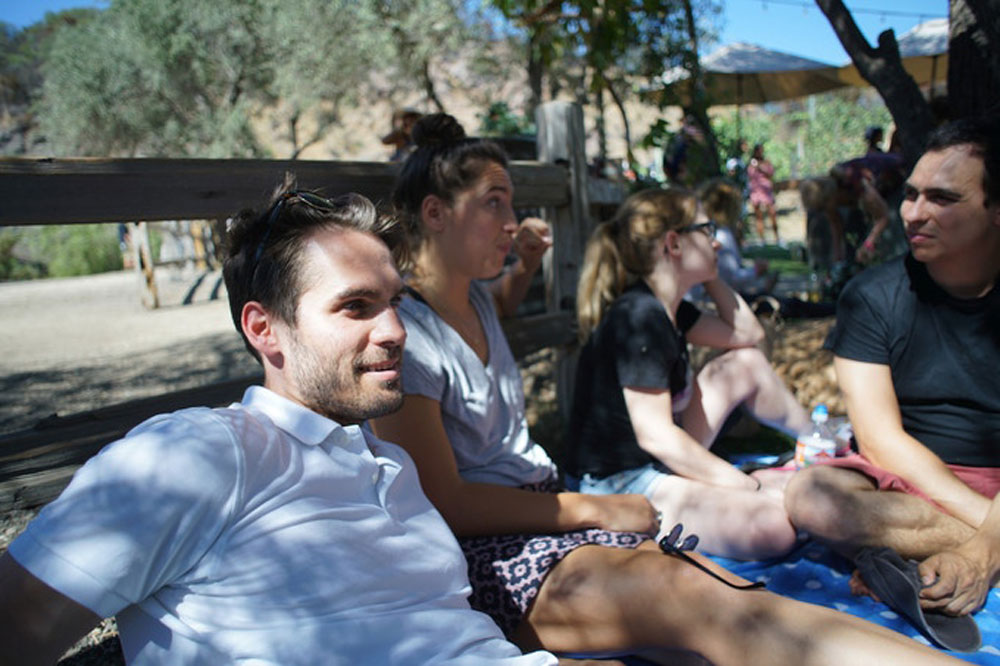In March, Jim Cummings had reached a professional apex, winning the Best Narrative Feature prize at SXSW for his debut feature “Thunder Road,” and with it, $60,000 worth of camera equipment rentals from Panavision to make his next film. At a time when most filmmakers would think about investing in their own future, Cummings was thinking about investing in others.
“I’m still debating whether it should go to Danny’s movie or if we should just make another one,” says Cummings, referring to his longtime collaborator Danny Madden, who is about to embark on an expansion of his SXSW winning short “Krista.” “What’s great about Panavision and that prize [is] there’s no movie I could make that we could spend that much on gear. You could shoot two features with that kind of camera budget, so it’s an incredible gift. I just usually make smaller movies than Panavision was expecting.”
Winning a prize that was a little too big to use on his own was perhaps fitting for Cummings, for whom no obvious infrastructure was in place to make “Thunder Road” in the first place. Even after making a splash at Sundance with the short in which he first played the unforgettable Officer Arnaud, a cop who wears his emotions on his sleeve for better or worse, the filmmaker grew frustrated with taking meetings ostensibly with the goal of turning the short into a feature, but ended up feeling like “in office field trips [where] they wanted to meet the guy who did the thing” without any further interest.
“I realized nobody was going to help out a short filmmaker even though the Thunder Road short had won Sundance and SXSW,” says Cummings. “I just wanted to make movies, so eventually I was like, ‘Well, shit, we’re just going to have to make movies. We’re just going to have to do it ourselves.’”
If it’s up to Cummings, there will be far fewer who have to go it alone, using the positive momentum generated by the success of “Thunder Road” and all he’s learned the hard way through making it to help other filmmakers make the jump from shorts to features. While Cummings has collected quite a following on social media with galvanizing messages of self-empowerment since “Thunder Road” took SXSW, he’s going beyond talking the talk, launching a weeklong retreat in Malibu in September that will be open to 10 filmmakers who can apply now for a small fee through the website shorttofeature.com. Currently, Cummings and “Thunder Road” producer Benjamin Wiessner are sorting through submissions and Cummings has secured an idyllic property in which filmmakers can spend a few nights focused on their film with peers around to help if needed.
“I went to a small film lab as a fellow, just to work on the sound for ‘Thunder Road’ and in doing so, I realized how easy it was, how relaxed I was, and available I was to be creative,” says Cummings. “In going to the lab, I realized that nobody really sets aside time to just write or to work on their projects. Nobody has that privilege to be able to do that, or they feel distracted by their phones or social media, so we should allow ourselves the time to be creative for five or seven days.”
At the time of writing, around 120 shorts have been submitted after Cummings put word out on Facebook and Twitter that he would be hosting the Short to Feature Lab and if accepted, filmmakers can expect to be paired with a mentor familiar with the genre their short takes place in and create a plan for their feature that can touch everything from story structure and practical production tips through distribution since as Cummings sees it, they’re all connected. (“Thunder Road”’s long takes, for instance, may look beautiful aesthetically, but is an example of shifting post-production to preproduction, having the major side benefit of creating less to edit while having crew on the clock, a trick the director learned as an associate producer on Trey Edward Shults’ “Krisha.”) Filmmakers will also be inspired by their peers, whether from an opening night film festival where they can watch each other’s shorts or group breakout sessions where they can bring their individual strengths to help films that are not their own.
As with most of Cummings’ endeavors, he’s set up a small, worthwhile Kickstarter campaign to help with incidentals and increase the potential for a sustainable, ongoing program. If successful, Cummings hopes to host the Short to Feature Lab once or twice a year, giving the opportunity for feedback that he craved and the sense of community that he’s enjoyed so much himself recently.
“We have this slate of friends making stuff that we’re helping out and it’s really because we know them or we met them at a film festival and I know that’s a very privileged position to even get into a film into a film festival,” says Cummings. “So like, “Okay, what about all those people who didn’t, who still have good stuff who are struggling like we were?’ Instead of it being just our friends’ movies that we’re helping out, we could make 10 feature films around the world that might not have been made or encouraged to be made, using the internet as this rallying rod to grab people. We just kept looking for people to turn our short into a feature and realized it was just us — we would have to do it. So now we’re doing it for 10 other people.”
For more information on the Short to Feature Lab, click here. To support the Short to Feature Lab on Kickstarter, click here.




